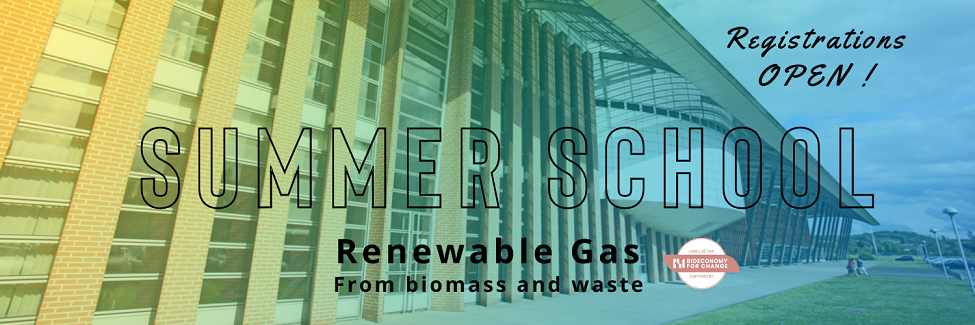
|
|
|
Training Program
The feedstock
Biomass and waste are organic matter based on carbon, hydrogen, oxygen, nitrogen and sulphur. Two main challenges arise to convert these feedstocks: they are heterogenous and broadly spread in the nature. The summer school will treat about these feedstocks, their availability and composition, and whether the composition and properties of a specific feedstock may guide the technology choice for its conversion.
The conversion processes
We may split the conversion process in two main stages: conversion process itself (the reactor) and the cleaning and upgrading of the gas to reach to specifications required downstream (a second stage of reaction, storage, or injection into the transportation network). Reaction step processes may be divided in two groups (biochemical process and thermochemical process) depending in the phenomena that drives the reaction. The summer school will be structured following these groups.
Biochemical processes Biochemical processes are mostly wet methods at low temperatures and pressures where biochemical reactions are driven by a large group of bacteria. Three main processes will be treated :
Thermochemical processes Thermochemical processes gather a large panel of high temperature processes with different atmospheres (inert, air, steam, CO2 and blends). Most of these processes are gas-solid reaction processes. The summer school will focus on the three main thermochemical processes to produce hydrogen and methane.
Gas cleaning and separation processes Both biological and thermochemical processes do not produce pure products. They produce a blend of molecules; few of these molecules must be removed to reach downstream operation inlet specification.
Hydrogenstorage Hydrogen may be stored at rather different size (from few grams to t of H2) and phase forms (solid, liquid and gas forms). Most of the hydrogen storage technologies will be covered, and advantages and drawbacks of these solutions will be discussed. A a specific focus will be done on underground massive gas storage, including deep saline aquifers. The course will cover the development of the aquifer and the storage site design. A real case of hydrogen massive storage in deep saline aquifers will be used as example. RenewGas Summer School 2025 - timetable
This summer school is planned to take place at IMT Mines Albi, All. des sciences, 81000 Albi
How to get to the IMT Mines Albi campus in Albi ?
A shuttle bus from Toulouse Blagnac airport will transport participants to the campus.
This same shuttle will stop at the Toulouse Matabiau train station for participants arriving in Toulouse by train.
The return journey from Albi to Toulouse will be provided in the same way and at no extra cost.
Where to stay ?
For those who wish, we offer rooms in a university residence on campus for 180€ before tax 10% per week.
Detailed information on the accommodation management will be provided on due time to registered participants. About IMT Mines Albi A school of the ministry in charge of industry, IMT Mines Albi is a school of the Institut Mines-Télécom, the number one group of engineering and management graduate schools in France. At the forefront of industrial and academic stakes on the national and international scenes, it acts as a scientific and economic leader by combining its 4 missions in a virtuous circle and driving innovation:
About RAPSODEE research center The research work of RAPSODEE (Research of Albi in Process Engineering of Divided Solids, Energy and Environment), UMR CNRS 5302, is based on a multi-scale process engineering approach oriented "products with controlled properties". Part of this work focuses on the valorization of bioresources (biomass and organic co-products) by thermochemical processes to obtain different products such as gases (syngas, methane, hydrogen), liquids (pyrolysis oils, alternative fuels) and functional solids (adsorbents, catalysts, carbon fibers, ceramics), and the valorization of molecules of biological interest (proteins, polyphenols...) from agricultural sources that do not compete with those already used for food. The reduction of the environmental impact by the development of green processes (at laboratory and pilot scale) is one of the main issues. RAPSODEE is part of the laboratory of excellence (LabEx) SOLSTICE (SOLAR: Science, Technology and Innovation for Energy Conversion). To federate skills and better ensure innovation and technology transfer to partner companies, RAPSODEE has two research and innovation platforms, VALTHERA located on the campus of IMT Mines Albi, and GALA® located on the ZAC Causse Espace d'Entreprises in Castres.
|

